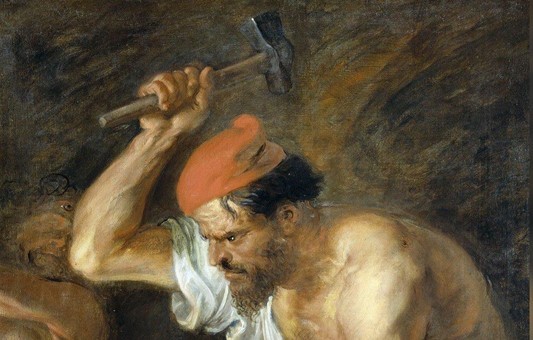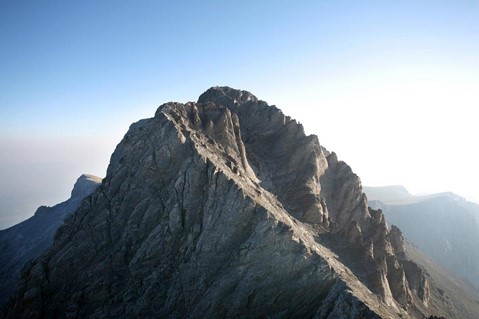By Sean Kelly, Managing Editor, Classical Wisdom
Poor Hephaestus, God of fire, metal working and all things volcanos… he’s not quite like the other gods, is he?
To begin with, he is the only one to suffer from a physical impairment, and a significant one at that. Throughout the corpus of Greek myth, Hephaestus’ lameness is a key part of his iconography, and it is central to his role in Homer’s Iliad.
He’s also the only god to work! That is to actively partake in labour…physically demanding, painful labour… His job, of course, is to forge as a blacksmith. Homer continuously emphasises his pain and humiliation, both of which are quite removed from the carefree lives enjoyed by the other gods. Despite this mockery, being repeatedly represented as distinct, as an ‘other’ amongst the gods, Hephaestus remains respected for his artistic output.
The Laughing Gods
Okay, so poor Hephaestus gets made fun of from time to time… that’s not so bad, is it?
But in the ancient world, it didn’t work like that. For instance, in Euripides’ Medea, the most awful fate imaginable to the central figure is the thought that her enemies would laugh at her.
οὐ γὰρ γελᾶσθαι τλητὸν ἐξ ἐχθρῶν, φίλαι.
For it is not endurable to be laughed at by one’s enemies, friends.
Considering the extreme nature of her later actions (and for anyone who needs a recap: she murders her own children), the fact that she finds laughter so unthinkable is… well… striking. Yet, this is consistent with the Homeric code. For human warriors seeking to gain fame and renown (or as the Greeks would have it, kleos), being laughed at is an unbearable humiliation.
But let’s look at laughter.
Laughter plays a significant role in the Iliad in its designation of the separation of the worlds of the human and the divine. In Book XXI, the gods engage in battle with one another… yet it is not the earth shaking, violent confrontation that is conjured by a phrase like “Battle of the Gods”. Rather, for the gods it is ultimately a game, a distraction, that results in great laughter amongst them. The source of the humour is that the battle, ultimately, is of no consequence to them, as they are immortal.
Contrast that to the toil and sweat of the human battles, stern competitions with death as the penalty for failure!
In the world of the Iliad, laughter is a privilege for the immortal gods, not granted to the short, painful lives of mortals.
So considering all this… it’s really quite important that in his first appearance in the Iliad, Hephaestus, a god, is laughed at… Indeed, it is a recurring pattern in Homer; Hephaestus is consistently shown to have a greater share in human experiences than what is normal for a god. This is emphasised further by the Hephaestus’ ‘backstory’ – aetiological myths incorporated by Homer in order to explain his ungodly wounds.
Cast from Mount Olympus
Before the beginning of the Iliad, Hephaestus is already different to the other gods. We are told in Book I of how he attempted to protect his mother Hera during a quarrel she had with Zeus, and for doing so he was thrown from Mount Olympus by Zeus, resulting in his injury to his legs. Upon hearing this story being recalled, the other gods laugh at Hephaestus in his misfortune.
Much later in Book XVIII of the Iliad, we are told that this casting from Olympus was not an isolated event. After sustaining his lameness from the first fall and following his return to Mount Olympus, his presence was deemed unbearable to his mother, leading to him being cast off Olympus again. After falling for a day and landing in Lemnos, Thetis and Eurynome functioned as his surrogate mothers for nine years.
Mount Olympus itself can be seen as a symbol of the gods’ relationship to humankind. They are distanced and removed from the pains that mark the lives of humans. That Hephaestus is thrown from Olympus twice is illustrative of him experiencing a level of suffering deeply unusual for a god, to the point that it has more in common with human experience. Of course, the other gods have the choice to leave Olympus and visit humans if they so desire, but these other sojourns of the gods are nothing like what happened to Hephaestus, twice violently cast away…
When Hephaestus recalls his time with Thetis and Eurynome, his period of healing from the painful wounds of his fall, he also speaks of the jewels he crafted for them. Clearly there is a direct connection between Hephaestus’ suffering and his creation of beautiful artworks.
The Shield of Achilles
The most important action that Hephaestus takes in the Iliad is near the end of the epic. After the armor of Achilles is taken from the body of Patroclus, Hephaestus forges the Shield of Achilles at the request of Achilles’ divine mother, Thetis.
In one of the most celebrated sections of the epic, we are provided with an extended description of this shield. It features a vast panoramic view of both nature and the wide variety of human events. That so much emphasis is granted to these depictions of scenes from everyday life is significant…. Cumulatively, they represent an attempt to recreate the totality of human experiences.
But the importance of the shield does not end there… Indeed, throughout the Iliad there are many “arming scenes,” wherein a character is dressed for war, and this sequence is essentially the ultimate “arming scene”. At this moment, the central heroic figure of the whole epic receives armor that reflects his true power. Not only that, but the length and detail of this scene signifies that the shield is a truly divine work of art as much as it is a divine shield.
That Hephaestus is able to create such a powerful and all-encompassing work of art is due to his particular and unusual connection to humanity. He is able to understand their experiences in a way that is truly remarkable and unusual for a god. It is only through these painful experiences that the Shield of Achilles can be forged.
Oh, poor Hephaestus… It is through his connection to humanity, and the requisite suffering that it entails, that he is able to create so much beauty and craftsmanship. He, unlike the other gods, takes his divine skills for the greater good of man. Perhaps the other deities… and indeed ourselves… can learn a bit from the old crippled smith.












No comments yet. You should be kind and add one!
Our apologies, you must be logged in to post a comment.